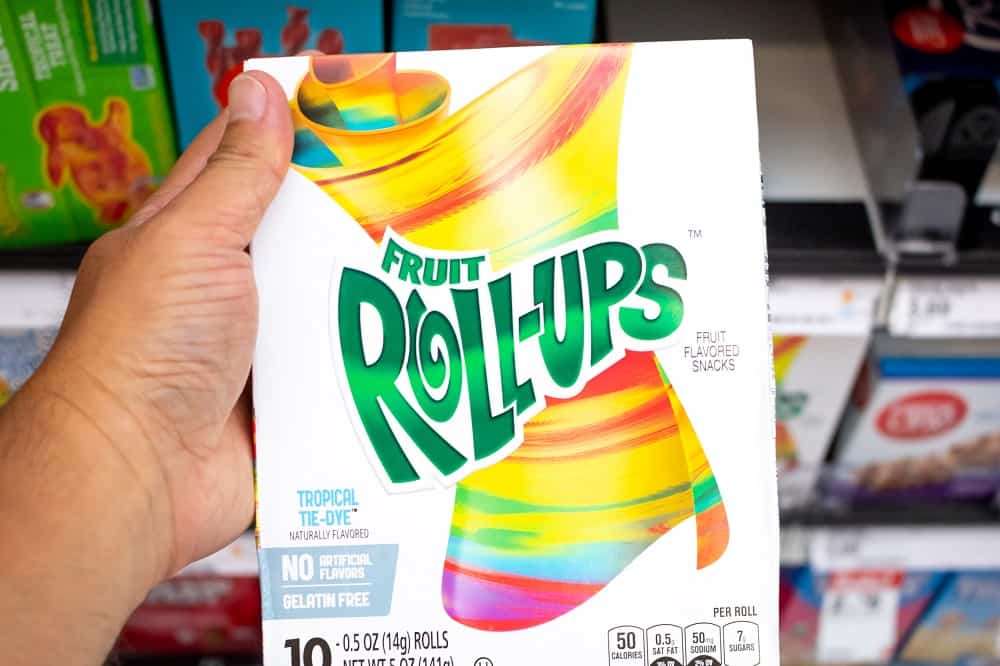First released back in 1983, Fruit Roll-Ups are a popular fruit snack that was popularized back in the 90s. Distributed under the Betty Crocker brand alongside other popular fruit snacks such as Fruit Gushers and Fruit by the Foot, Fruit Roll-Ups are characterized as a rolled-up sheet of stretchy candy. The fruit snack is backed by a backing sheet of cellophane to avoid the product from sticking to itself. As a common snack, it is important for others to know if Fruit Roll-Ups are safe for vegan diets.
Fruit Roll-Ups can be considered vegan since they do not contain any obvious animal product or derivative. However, Fruit Roll-Ups do contain some ingredients that are considered gray areas. These ingredients include sugar, natural flavors, and artificial coloring agents. These are considered gray area ingredients because they are not obviously vegan. Some vegans are okay with these ingredients while some vegans still avoid these ingredients to stay on the safe side.
Table of Contents
Are Fruit Roll-Ups Vegan?

Fruit Roll-Ups are popular fruit-flavored snacks. They can be considered perfectly appropriate for people with vegan lifestyles since Fruit Roll-Ups do not contain any ingredient that is blatantly derived from animals. Thus, there are vegans that can comfortably consume Fruit Roll-Ups.
Unfortunately, Fruit Roll-Ups also contain other ingredients that some vegans tend to avoid. These are considered gray area ingredients because while some vegans are fine with these ingredients, some vegans are not. These gray area ingredients include sugar, natural flavors, and artificial coloring agents.
Sugar and natural flavors are common ingredients found in food and beverage products. However, some vegans find these ingredients difficult to ascertain if whether they are truly vegan or not. On the other hand, artificial coloring agents certainly do not contain animal products but exist due to a questionably unethical process.
Fruit Roll-Ups Ingredients List
The list of ingredients of Fruit Roll-Ups typically includes (1): corn syrup, dried corn syrup, sugar, pear puree concentrate, palm oil. Contain 2% or less of: citric acid, sodium citrate, fruit pectin, monoglycerides, malic acid, vitamin C (ascorbic acid), acetylated monoglycerides, natural flavor, color (red 40, blue 1, yellow 5, and yellow 6).
The official Betty Crocker website lists several different flavors including (2): Flavor Mixers, Strawberry Sensation, Jolly Rancher, Sour, Tropical Tie-Dye, Blastin’ Berry Hot Colors, and Variety Pack. However, the ingredients are almost identical in the different flavors listed. A difference can be found in the Sour flavor where tartaric acid is also included. However, the key differences in the ingredients of the different flavors of Fruit Roll-Ups are mainly the food coloring agents used.
Sugar
Sugar is a common ingredient in snacks such as Fruit Roll-Ups and an especially commonly used sweetener in the food and beverage industry. Many people automatically assume that sugar should be vegan since it is derived from a plant source such as sugarcane or sugar beets. However, sugar can become non-vegan depending on how it was produced.
Although the sugar is already edible once it is extracted, sugar companies further refine the sugar to make it more appealing to the mass market. Various refinement processes are involved in sugar production, and different companies can utilize different methods. One method in particular is filtration.
Filtration is required to increase the purity of the sugar by removing non-sugar components. Different filtration methods are being used in the sugar industry. Some industries would use granulated carbon, for example. On the other hand, some companies would use bone char (3). Bone char is the charred and ground skeletal remains of animals. It is a cheap and effective filter material. However, sugar filtered using bone char can no longer be considered vegan since that means an animal product was involved in its production.
The problem with using bone char in the sugar industry is the difficulty in determining if a particular company uses bone char in its operations. The problem is further exacerbated by large food manufacturers that use sugar in their products. It is not uncommon for these food manufacturers to have multiple sources of sugar which means it would be even harder to trace if whether the sugar a food manufacturer uses was produced with bone char or not.
The practice of using bone char in the sugar industry is more prevalent in the US which is why vegans from other parts of the world are less concerned with their sugar.
Natural Flavors
Natural flavors are a common additive in food and beverages, and it is responsible for making products taste the way they do. Unlike other ingredients that can serve other functional roles, natural flavors primarily act as a flavoring agent. The ingredient is an umbrella term for various substances that are naturally sourced, unlike the constituents of artificial flavors. The problem vegans have with natural flavors is the definition itself. Specifically, the FDA defines natural flavors as (4):
The essential oil, oleoresin, essence or extractive, protein hydrolysate, distillate, or any product of roasting, heating or enzymolysis, which contains the flavoring constituents derived from a spice, fruit or fruit juice, vegetable or vegetable juice, edible yeast, herb, bark, bud, root, leaf or similar plant material, meat, seafood, poultry, eggs, dairy products, or fermentation products thereof, whose significant function in food is flavoring rather than nutritional.
FDA.gov
Though natural flavors are required to consist of substances that can only be obtained from nature, the definition does not help inform vegans of the contents. From the definition above, natural flavors encompass both animal- and plant-derived products. The vagueness of the definition is the reason why many vegans believe natural flavors are a gray area ingredient because there is no way to truly know if a product that has natural flavors is vegan or not – unless specifically stated in the label or confirmed by the company.
Food Coloring Agents
Color is an important part of the consumer experience, especially when the products are snacks marketed towards children. Thus, it comes as no surprise that Fruit Roll-Ups have food coloring agents. There are many food coloring agents that are completely allowed in the vegan community. However, artificial coloring agents are highly debated.
Artificial coloring agents are completely synthetic which means they are produced in laboratories instead of being extracted from some other source. Being synthesized also means that artificial coloring agents are completely devoid of animal substances which means that artificial coloring agents should be fine for dietary vegans. However, there are vegans who abstain from products that use artificial coloring agents due to an ethical concern.
Since artificial coloring agents are completely synthetic, it is important to make sure that they are safe for human consumption. Thus, various food safety authorities would require artificial coloring agents to undergo numerous safety tests for them to be approved. However, testing the safety of artificial coloring agents has long been known to include the use of animal models. The use of animals in safety testing is considered to be highly unethical due to the inhumane treatment of the animals involved.
Animal testing is especially unethical when modern alternatives can be used for safety testing instead. Alternatives include the use of cell models and in silico studies (i.e., the use of computer modeling).
Specifically, Fruit Roll-Ups use red 40, blue 1, yellow 5, and yellow 6. Collectively, these artificial coloring agents have been known to be tested on various animals such as dogs, cats, mice, rats, rabbits, pigs, and such (5, 6, 7, 8).
References
1. https://www.bettycrocker.com/
2. https://www.bettycrocker.com/




